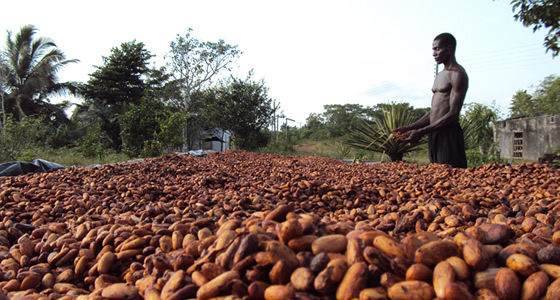
Major African cocoa plants in Ivory Coast and Ghana have stopped or cut processing because they cannot afford to buy beans, four trading sources said, meaning chocolate prices around the world are likely to soar.
Chocolate-makers have already increased prices to consumers, after three years of poor cocoa harvests, with a fourth expected, in the two countries that produce nearly 60% of the world’s cocoa.
Cocoa prices have more than doubled over the last year, scaling numerous all-time highs.
“We need massive demand destruction to catch up with the supply destruction,” Tropical Research Services’ Steve Wateridge, a world expert on cocoa, said.
Chocolate-makers cannot produce chocolate using raw cocoa and rely on processors to turn beans into butter and liquor that can be made into chocolate.
But the processors say they cannot afford to buy the beans.
State-controlled Ivorian bean processor Transcao, one of the country’s nine major plants, said it had stopped buying beans because of their price.
It said it was still processing from stock, but did not say what capacity it was running at. Two industry sources said the plant was almost idle.
They asked not to be named because they were not authorised to speak publicly on the issue.
One of the two sources said more major state run plants could shut soon in top grower Ivory Coast, which produces nearly half the world’s cocoa.
The same two sources said even global trader Cargill struggled to source beans for its major processing plant in Ivory Coast, halting operations for about a week last month. Cargill did not respond to a request for comment.
In No. 2 cocoa grower Ghana, most of its eight plants, including state-owned Cocoa Processing Company (CPC), have repeatedly suspended work for weeks since the season started in October, two separate industry sources said.
CPC said it is operating at about 20% of capacity because of the shortage of beans.
DISRUPTION AT THE FARM GATE
The price rally has derailed a long-established mechanism for global cocoa trade, through which farmers sell beans to local dealers who sell them on to processing plants or global traders.
Those traders then sell beans or cocoa products – butter, powder and cocoa liquor – to global chocolate giants such as Nestle (NESN.S), opens new tab, Hershey (HSY.N), opens new tab and Mondelez (MDLZ.O), opens new tab.
In normal times, the market is heavily regulated – traders and processors purchase beans from local dealers up to a year in advance at pre-agreed prices. Local regulators then set lower farmgate prices that farmers can charge for beans.
However, in times of shortage like this year, the system breaks down – local dealers often pay farmers a premium to the farmgate price to secure beans.
The dealers then sell the beans on the spot market at higher prices instead of delivering them at pre-agreed prices.
As global traders rush to purchase those beans at any price to meet their obligations with the chocolate firms, local processors are often left short of beans.
Ivorian and Ghanian authorities normally try to protect local plants by issuing them with cheap loans or by limiting volumes of beans that global traders can purchase.
This year, however, plants are not getting the cocoa they pre-ordered and cannot afford to buy at higher spot prices.
Already, chocolate-makers have raised prices. U.S. retail stores charged 11.6% more for chocolate products last year compared with 2022, data from market research firm Circana shows.
The International Cocoa Organisation (ICCO) expects global cocoa production will fall by 10.9% to 4.45 million metric tons this season.
Grindings – a measure of demand – will fall by 4.8% to 4.78 million as processors struggle to buy beans, and supply less butter at a higher price to chocolate-makers, which in turn raise prices.
The supply-demand mismatch will leave the market with a deficit of 374,000 tons this season, up from 74,000 tons last season, according to the ICCO.
This means processors and chocolate firms will have to draw on cocoa stocks to fully cover their needs. The ICCO expects global cocoa stocks to fall to their lowest in 45 years by the season end.
Wateridge of Tropical Research said the cocoa market could post another deficit next season based on the severity of bean disease in West Africa.
The market has not seen four successive years of deficit since the late 1960s, ICCO data shows.
Source: reuters.com























